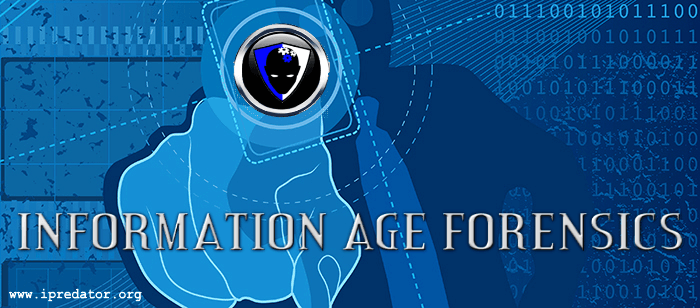Information Age Forensics
Cybercriminal Psychology
Information Age Forensics (IAF) integrates the fields of Criminal, Cybercriminal, Abnormal and Developmental Psychology with iPredator and Digital Forensics Investigation. IAF recognizes the iPredator construct as a cogent model with multiple applications. Information Age assailants, aggressors, criminals, deviants and the violently disturbed, who use Information Technology in their nefarious and harmful activities, are maladaptive and psychopathological classifications new to humanity. Provided are definitions relevant to IAF.
The Information Age is a period beginning in the last quarter of the 20th century and presently thriving in the second decade of the 21st century. The Information Age is a stage in societal and technological development like the Industrial Revolution (1750-1942). The Information Age represents the evolution, emergence, consumption of and reliance upon Information and Communications Technology (ICT).
In a mere four decades, ICT and its importance to humanity have led many to surmise that the planet and its human inhabitants are amidst an Information Revolution. Mobile device technology, telecommunications, social media and the abstract concept and artificial universe of cyberspace are just a few examples of humanities newest frontiers to obtain, exchange and disseminate information.
The planet is experiencing a shift from traditional industry, born and bred during the Industrial Revolution, to an economy based on the creative and rapid manipulation of information. Just as the Industrial Revolution changed the lives of humanity, the Information Revolution is a societal shift rapidly changing humanity’s social, economic and psychological conditions of the times. The Information Revolution marks another major turning point in history, following the Industrial Revolution and changing every aspect of daily life unlike ever before.
Information Age Forensics (IAF)
Information Age Forensics (IAF) is the science and technology of investigating the typologies, motivations, tactics and psychopathology of iPredators who use Information and Communications Technology (ICT) for maladaptive, deviant or criminal objectives. Information Age Forensics examines the iPredator typologies of cyberbullying, cyberstalking, cyber harassment, internet trolling, cybercrime, online sexual predation, cyber terrorism and habitual online deception.
Vital to full comprehension of IAF is considering valid the premise of iPredators being variants of the classical criminal, deviant and aggressor. Information and Communications Technology, cyberspace and the Information Age have created an entirely new population thriving off information technology for maladaptive and anti-social goals. Information technology and cyberspace are not tools used by Information Age aggressors (iPredators). They are a fundamental part of this new generation seeking to harm, victimize, control or dominate their chosen victim(s).
Author’s Personal Aside
It has been several years now, but I distinctly remember a couple older professorial type Ph.D.’s respectfully commenting on the iPredator construct. They stated it was professionally written, concise and informative, but my premise was unfounded. They felt that the typologies of iPredator were classic criminals, deviants and severely disturbed persons who use information technology as tools requiring no need for revisiting, redefining or reclassifying previously accepted definitions.
My humble and equally respectful response was a resounding statement of disagreement. What they did not consider was that the environment, in which the vast majority of iPredator’s malevolent and nefarious activities occur in, cyberspace, is unlike any other perceptual forum previously experienced by humanity. My philosophical retort was highly persuasive causing them to recant their previous assumptions and is as follows:
“Cyberspace is an abstract & artificial electronic universe. It is a facsimile of reality affording the assailant, potential victim and all online users the choice to activate and manipulate the “veil of anonymity” available in cyberspace. Never has society or human consciousness been confronted with an illusory environment, which is interpreted as real, in which none of the known physical senses can be relied upon for self-preservation. Hence, the assailant, victim and all humanity engage in a perceptual myth placing the assailant in utter control of the outcome.” Michael Nuccitelli, Psy.D. (2011)
Respectfully thanking them for their pre-processed constructive criticism turned clarity, I concluded with informing them that iPredator was developed using the prophetic theoretical principles of Alfred Adler (1870-1937) and Carl Jung (1871-1961). When steeped in my own Jungian psychological fantasy world, I often wonder how Dr. Adler and Dr. Jung would interpret the human experience in relationship to how the Dark Side of Cyberspace seems to be slowly enveloping humanity. The formal definition of iPredator is as follows:
“It is the individual who is not interested in his fellow men who has the greatest difficulties in life and provides the greatest injury to others. It is from among such individuals that all human failures spring.” Alfred Adler (1870-1937)
Briefly described below is the definition of iPredator and the iPredator typologies of cyberterrorism, cyberstalking, cybercrime and online sexual predation. These areas are where IAF would be most helpful. In a pre-Information Age world there was forensics, criminal psychology, criminal profiling and criminology. Now? IAF, Cybercriminal Psychology, Cybercriminal Profiling and Cyber Criminology must be incorporated.
iPredator
iPredator: A person, group or nation who, directly or indirectly, engages in exploitation, victimization, coercion, stalking, theft or disparagement of others using Information and Communications Technology [ICT]. iPredators are driven by deviant fantasies, desires for power and control, retribution, religious fanaticism, political reprisal, psychiatric illness, perceptual distortions, peer acceptance or personal and financial gain. iPredators can be any age or gender and are not bound by economic status, race, religion or national heritage.
iPredator is a global term used to distinguish anyone who engages in criminal, coercive, deviant or abusive behaviors using ICT. Central to the construct is the premise that Information Age criminals, deviants and the violently disturbed are psychopathological classifications new to humanity.
Whether the offender is a cyberstalker, cyber harasser, cybercriminal, online sexual predator, internet troll, cyber terrorist, cyberbully, online child pornography consumer/distributor or engaged in internet defamation or nefarious online deception, they fall within the scope of iPredator. The three criteria used to define an iPredator include:
- A self-awareness of causing harm to others, directly or indirectly, using ICT.
- The usage of ICT to obtain, exchange and deliver harmful information.
- A general understanding of Cyberstealth used to engage in criminal or deviant activities or to profile, identify, locate, stalk and engage a target.
Unlike human predators prior to the Information Age, iPredators rely upon the multitude of benefits offered by Information and Communications Technology [ICT]. These assistances include exchange of information over long distances, rapidity of information exchanged and the seemingly infinite access to data available. Malevolent in intent, iPredators habitually deceive others using ICT in the abstract and artificial electronic universe known as cyberspace. Therefore, as the internet naturally offers all ICT users anonymity, if they decide, iPredators actively design online profiles and diversionary tactics to remain undetected and untraceable.
Cyberstealth, a sub-tenet of iPredator, is a covert method by which iPredators attempt to establish and sustain complete anonymity while they engage in ICT activities planning their next assault, investigating innovative surveillance technologies or researching the social profiles of their next target. Concurrent with the concept of Cyberstealth is iPredator Victim Intuition [IVI], an iPredator’s IVI is their aptitude to sense a target’s ODDOR [Offline Distress Dictates Online Response], online & offline vulnerabilities, psychological weaknesses, technological limitations, increasing their success of a cyber-attack with minimal ramifications.
“Knowing your own darkness is the best method for dealing with the darkness of others.” Carl Jung (1871-1961)

Cyberstalking
Cyberstalking: Cyberstalking is defined as the use of Information and Communications Technology (ICT) to stalk, control, manipulate, threaten or make unwanted advances towards a child, adult, business or group. Cyberstalking is both a tactic used by an ICT assailant and typology of pathological ICT user. Cyberstalking tactics include false accusations, threats of harm, habitual monitoring, surveillance, implied threats, identity theft, damage to property and gathering information to manipulate and control their target. To meet the criteria of Cyberstalking, the information and tactics used must involve a credible or implied physical and psychological threat to the target. An example of physical threat involves bodily harm to the target or their loved ones via ICT.
Examples of psychological threats involve disparagement, humiliation, disinformation dissemination and environmental damage to the target’s reputation, credibility or financial status if the target does not acquiesce to the cyberstalker’s demands. The Internet is a global medium regardless of frontiers, and this creates new possibilities for the growing class of online. Given the Internet is inexpensive and easy to access, distance between cyberstalkers and their targets are no longer a confounding factor. Cyberstalking is both a strategy to target other ICT users and a psychiatric pathology. When internet is a tactic, the assailant does not need to be motivated by psychiatric illness.
Online Sexual Predation
Online Predation: The typology of iPredator that is categorized as Online Predators have a variety of different terms used to describe the same patterns and motivations for their abuse. Online Sexual Predators are defined as adult online users who seek to exploit vulnerable children or adolescents for sexual and other abusive purposes.
Online Predators are sexual predators who use Information and Communications Technology and the Internet to locate, target and victimize minors. Common forums used by Internet Predators to target children include chat rooms, instant messaging or social networking sites for the purpose of flirting with and meeting others for illicit sexual experiences.
Online Child Predators are motivated to manipulate or “groom” a minor with the ultimate goal of meeting and engaging in sexual activity, despite knowing they are engaging in illegal activities. In instances where meeting their victims is not the primary objective, Online Predators also attempt to persuade children and adolescents to participate in some form of online sexual and/or sexually provocative activity motivated by financial gain engaging in the distribution and sale of child pornography.

Cybercrime
Cybercrime: Cybercrime is defined as crimes and criminal activity committed on the Internet using Information and Communications Technology as the tools to target victims. All forms of cybercrime involve both Information and Communications Technology and a targeted victim(s). Cybercrime is segmented into two distinct categories involving the focus of the cybercriminal activities. These activities are focalized on the technology of ICT to achieve the cyber criminal’s aims for personal and financial gain or targeted at the person using the Information and Communications Technology. When the individual is the main target of cybercrime, ICT is the tool rather than the target. These are the crimes, which have existed for centuries in offline societies.
Scams, Identity Theft and Internet Fraud have existed long before the development of information technology, but in non-digital form. Cybercriminals utilize technological tools that increase their potential pool of victims and make them difficult to identify and apprehend. Cybercrime targets people, property or governments using Information and Communications Technology.
Cyber Terrorism
Cyber Terrorism: Cyber Terrorism is defined as the use of Information and Communications Technology (ICT) by iPredators, organized groups and/or terrorist groups to advance their agenda motivated by religious, political and/or philosophical ideologies. Examples of cyber terrorism include 1. The use of ICT to organize and execute attacks against networks, and Information and Communications Technology (ICT) infrastructures. 2. The exchanging of information or making threats electronically. 3. The act of hacking into computer systems. 4. Introducing viruses and malware to vulnerable networks. 5.Defacement of websites and blogs. 6. Denial-of-service attacks 7. Terrorist threats made via electronic communication.
When strategic cyber-attacks are motivated for financial gain, these attacks are defined as cybercrime. Cyber terrorism is any premeditated, politically, religious or philosophically motivated attack against information, computer systems, computer programs and data, which results in violence against non-combatant targets by sub-national groups or clandestine agents. A cyber terrorist attack is designed to cause physical violence or extreme financial harm to the targeted victims or community.
According to the U.S. Commission of Critical Infrastructure Protection, cyber terrorist targets include the banking industry, military installations, power plants, air traffic control centers and water systems. The F.B.I. define cyber terrorism as “The premeditated, politically motivated attack against information, computer systems, computer programs and data which result in violence against noncombatant targets by sub-national groups or clandestine agents.”
iPredator
An Information Age Forensics Concept
iPredator is a global concept that includes children, adults and organized groups who, directly or indirectly, use ICT to harm or exploit others. The goal of the United States and all industrialized nations is to stop the growth of iPredators by educating its citizens on their tactics and strategies. From a profiling and investigation standpoint, assessment of an iPredator’s cyberstealth tactics and Digital Footprint can assist authorities in their profiling, identification and apprehension. Just as classic criminal profiles have signatures used to apprehend them, iPredators have digital signatures as well.
The importance of ICT and the Internet to humankind is different to everyone and as unique as a fingerprint. For some, ICT and the Internet are nothing more than tools of convenience for conducting mundane tasks. For others, their social, scholastic, business and/or financial affairs disclosed online are crucial to their life functioning, self-esteem, self-worth, success and perceptual world.
As ICT, social media, virtual reality and the Information Age rapidly expands becoming integral to humanities daily activities, understanding the basic tenets of these new dimensions are preponderant. What always comes with opportunity and new frontiers are elements unknown and potentially dangerous. It is these unknown elements, lurking within cyberspace, which ICT users and their loved ones must be vigilant about.
“Prior to the Information Age, physiological health was a priori to survival and self-preservation. Now, and ad infinitum, psychological health is equally, if not more, important.” Michael Nuccitelli Psy.D.

Michael Nuccitelli, Psy.D.
Michael Nuccitelli, Psy.D. is a NYS licensed psychologist, cyberpsychology researcher and online safety educator. In 2009, Dr. Nuccitelli finalized his dark side of cyberspace concept called iPredator. Since 2010, he has advised those seeking information about cyberbullying, cyberstalking, cybercriminal minds, internet addiction and his Dark Psychology concept. By day Dr. Nuccitelli is a practicing psychologist, clinical supervisor and owner of MN Psychological Services, PLLC. After work and on the weekends, he volunteers helping online users who have been cyber-attacked. Dr. Nuccitelli’s is always available to interested parties and the media at no cost. This website and everything created by Dr. Nuccitelli is educational, free and public domain.
